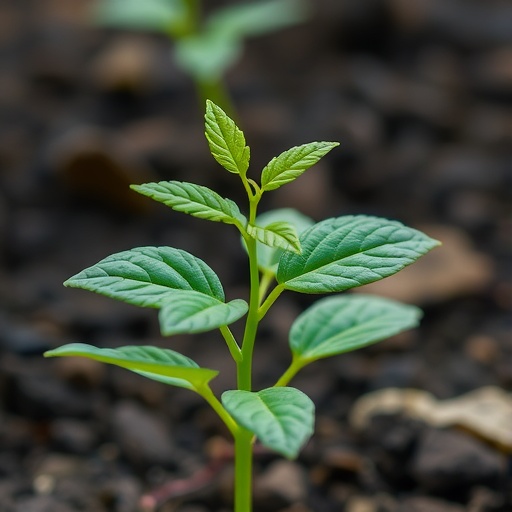In a groundbreaking review published in Discover Plants, a team of researchers led by S. Rani and A. Sogarwal explores the intricate and often underappreciated interactions between plants and beneficial bacteria. This study sheds light on how these relationships can be strategically harnessed to enhance abiotic stress tolerance in plants—an increasingly critical factor as climate change continues to challenge agricultural productivity worldwide. The team delves into the molecular mechanisms by which bacterial communities can bolster plant resilience against abiotic stresses such as drought, salinity, and extreme temperatures.
The utilization of plant-bacterial interactions offers promising avenues for sustainable agriculture. With a growing global population demanding more from our crops while climate change wreaks havoc on traditional farming methods, the authors emphasize the need for eco-friendly and innovative solutions. Their comprehensive analysis draws on recent advancements in microbiome research and biotechnology, highlighting the potential of certain bacteria to act as natural growth promoters. This, in turn, opens the door for less reliance on chemical fertilizers and pesticides, marking a shift towards more sustainable farming practices.
One critical mechanism discussed is the production of plant growth-promoting substances by specific bacterial strains. These substances can stimulate root development and improve nutrient uptake, ultimately leading to enhanced growth even under suboptimal environmental conditions. The researchers note that certain bacteria are adept at producing phytohormones such as Auxins, Gibberellins, and Cytokinins, which play vital roles in plant growth regulation. This biostimulatory effect can render plants more capable of withstanding periods of drought or nutrient deficiency, making it a key focus for future agricultural biotechnologies.
Moreover, the review highlights the role of these beneficial bacteria in enhancing the soil microbiome. A robust soil microbiome is indispensable for maintaining plant health and soil fertility. Bacteria interact with both plant roots and other microorganisms in the soil, creating a synergistic environment that promotes plant growth. The authors point out that healthy soil microbiomes can help sequester carbon, reduce soil erosion, and improve overall soil health. Such benefits align well with global sustainability goals and underscore the urgent need to focus research efforts in this direction.
The complex signaling pathways involve various plant-bacterial interactions that lead to enhanced stress tolerance. The authors discuss how signaling molecules, such as flavonoids, can mediate cross-talk between plants and soil microbes. This communication is vital for establishing mutualistic relationships where both species can thrive. The ability of plants to detect and respond to bacterial signals ensures that these interactions are not only beneficial but also finely tuned to the environmental context.
Field studies supporting these findings are also summarized in the review, showcasing real-world applications of harnessing bacterial interactions. For instance, certain bacterial inoculants have been tested in various crop species, demonstrating increased yield and resilience in trials subjected to water scarcity. These empirical results underline the credibility of using microbial strategies to combat the adverse effects of climate change on our crops.
However, the researchers caution that while the potential is vast, there is still much to learn about the specificity and consistency of these plant-bacterial interactions across different environments and plant species. Understanding the ecological niches where these bacteria thrive is crucial for effective application. Future research needs to focus on identifying the most effective bacterial strains for specific crops and conditions, optimizing their application in diverse agricultural settings.
In their conclusion, Rani and Sogarwal highlight the need for interdisciplinary approaches that integrate plant science, microbiology, and agricultural engineering. They advocate for increased funding and collaboration between academia and industry to expedite the translation of this knowledge into practical agricultural solutions. As the world faces pressing food security challenges, they urge researchers and policymakers to prioritize studies on plant-bacterial interactions as part of a broader strategy to achieve sustainable food systems.
The work presented in this review represents a significant step forward in our understanding of how beneficial bacteria can assist in mitigating abiotic stresses in plants. As climate conditions become increasingly erratic, leveraging nature’s alliances presents a unique opportunity for enhancing crop resilience. The positive implications for global food security, combined with the shift toward more sustainable farming practices, make this area of research not just relevant but vital.
In light of these findings, it becomes clear that the collaboration between the worlds of plant life and microbiology holds the key to advancing agricultural practices in the future. As researchers continue to unravel the complexities of these interactions, the hope is that this knowledge will lead to innovative solutions that protect crops and the planet alike.
With a focus on cultivating these plant-bacterial partnerships, the agricultural community can look forward to harnessing natural processes that empower plants to thrive despite the mounting challenges posed by climate change and environmental degradation. The results of this review provide both inspiration and a clear direction for future research efforts that aim to create resilient, bio-informed agricultural systems.
Subject of Research: Interaction between plants and beneficial bacteria to enhance abiotic stress tolerance in plants.
Article Title: Harnessing plant-bacterial interactions to enhance abiotic stress tolerance in plants: a review.
Article References:
Rani, S., Sogarwal, A., Gargi et al. Harnessing plant-bacterial interactions to enhance abiotic stress tolerance in plants: a review. Discov. Plants 2, 250 (2025). https://doi.org/10.1007/s44372-025-00330-0
Image Credits: AI Generated
DOI:
Keywords: Plant-bacterial interactions, abiotic stress tolerance, sustainable agriculture, microbiome, plant growth-promoting bacteria, climate change, biostimulants, crop resilience.




